Imagine waiting for the strawberry harvest season only to discover that something has drilled ugly holes in your strawberries. The neighbors hear you screaming. WHO DID THIS? Well, slugs could be the culprits you are looking for. Slugs attack ripe strawberries and leave rough holes that render the fruit inedible and unmarketable. That’s not it, though! In this article, I’ll give you my effective tips on how to prevent slugs on strawberries.
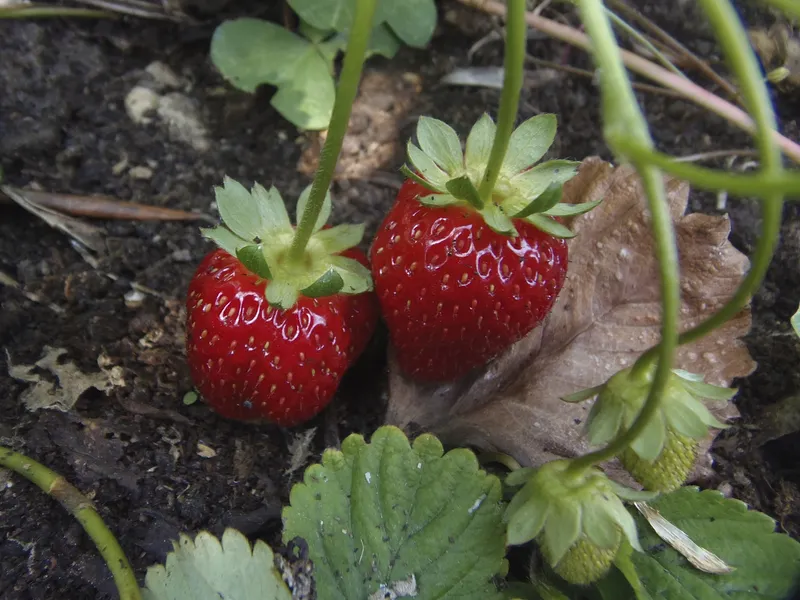
Slugs damage ripe strawberry fruit, rendering it unsellable.
These partially eaten, rotting strawberries attract other pests such as sowbugs, earwigs, and tiny beetles, which causes even more damage to the strawberries, fruits, and plants.
Slugs are often tricky to deal with since you rarely see them in daylight. They attack in the dark at night, and the damage caused in just one night is enough to ruin your strawberry crop.
So, how can you stop slugs from attacking your strawberries? Luckily, there are many ways!
You can keep slugs away from strawberries by reducing the water you give the plants, removing mulch and leaves from the surrounding area, capturing the slugs manually, and distracting them with citrus peels. Physical slug barriers can also be beneficial. While other slug deterrents include seaweed, birdhouses, petroleum jelly, eggshells, and commercial slug killers.
Having said that, the control of slugs typically involves a combination of various strategies. Continue reading to learn more!
Related: What Is Eating My Strawberries? The Culprits & How To Control Them!
What Are Slugs? How To Identify Slug-Damaged Strawberry Plants?
Slugs can be severely damaging to strawberry plants and their fruits. Without proper protection, slugs can wreak havoc on your strawberry crop, leaving you with nothing. But, how can you tell if the critters eating holes in your strawberries are slugs and not some other animal or bird?
Well, do not worry! We have got you covered!
What Are Slugs? How Are Slugs Different From Snails?
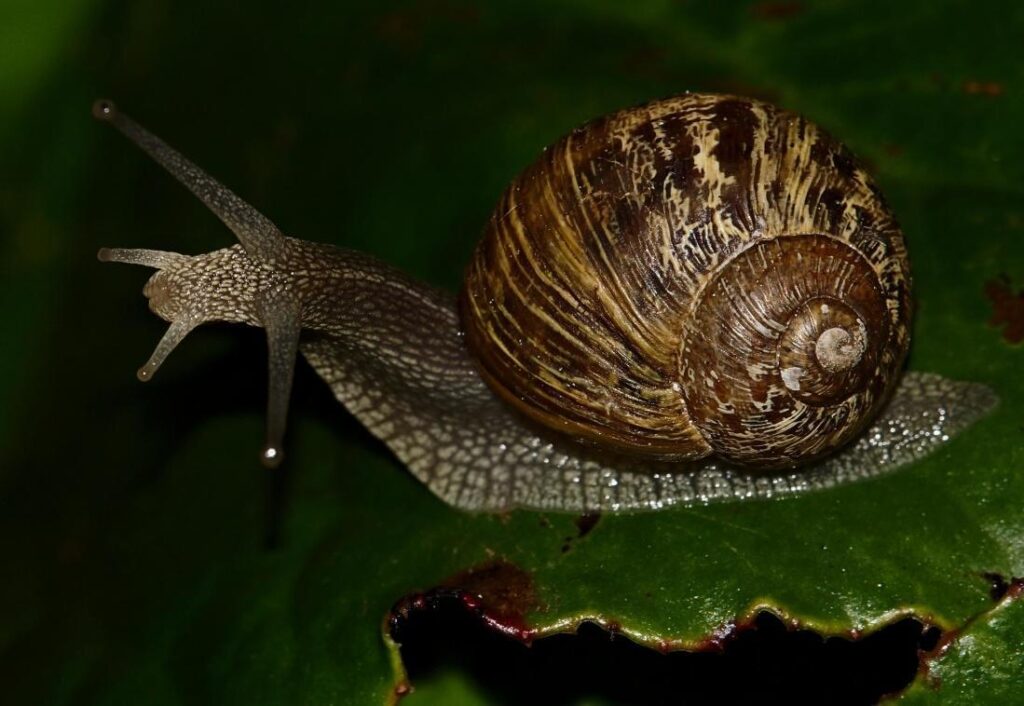
The primary distinction between them is that a snail has a shell while a slug does not.
In the animal kingdom, gastropod mollusks, which include slugs and snails, are a unique group of animals. Gastro means stomach, and pod means foot. Just hearing the name “a stomach on foot” should be enough to raise red flags about how these animals eat.
Slugs devour the plants in your garden with ravenous appetites, and a typical garden could have up to 15,000 slugs. Consequently, every gardener must employ slug control tactics and strategies. But how are you going to tell the difference between slugs and snails?
Snails and slugs are easily distinguished from one another by the huge, protective shell that snails carry on their backs. Aside from this, they are essentially identical to one another.
Snails and slugs have two upper tentacles that protrude from their forehead. And they have eyes on the tips of these tentacles that they use for sight and scent.
Identification Of Slug Damage To The Plants
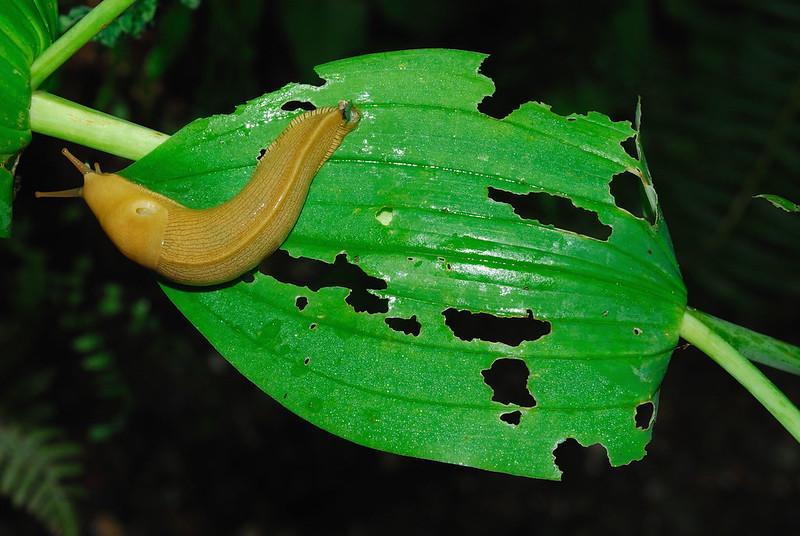
Slugs have rasping mouthpieces that create uneven holes in plant tissue.
Slugs and snails eat both living and dead plant material, but delicate plants like strawberries are the most delightful things for them to eat. Unfortunately, slugs can also harm lettuces, delicate herbs such as basil, and foliage plants such as hostas.
As they feed, slugs and snails create enormous holes of varying sizes and shapes in soft plant tissues such as leaves and blooms. However, compared to the rough, irregular holes created by many insects, the holes left by snails and slugs are remarkably smooth.
You won’t typically catch slugs in the act because slugs are nocturnal feeders. The presence of irregular holes in the plant tissues and mucus trails is the only indicator that slugs are the culprits behind the damage to your plants.
Plants will likely have slug damage in the spring and fall. Therefore, if you see any damage to plants during these times of the year, it is most likely due to slugs.
Are Slugs Attracted To Strawberries?
Planting strawberries in your garden is a surefire way to attract slugs. Slugs are drawn to the delicate fruits that are easy to gnaw on, and strawberries fit this description perfectly. In addition, sugar in strawberries is a massive attraction for slugs.
Moreover, in addition to being juicy and sweet, s strawberry fruits lie low to the ground, which makes them an accessible target for slugs.
Moreover, fruits, including strawberries, give off ethylene gas when they ripen. And ethylene gas attracts slugs and other garden pests to the fruits.
How To Protect Strawberries From Slugs?
If your strawberry harvest is not protected from slugs, they may wreak havoc on it, leaving you with little or no strawberries to harvest. Utilizing organic approaches should be your first line of defense against slugs. Organic methods are safe for both you and the environment.
The use of chemical treatments is an alternative that might be considered if the issue persists or if the affected region is too large.
Related: Juicy Secrets: A Guide To Growing Strawberries In Pots
How To Get Rid Of Slugs Naturally?
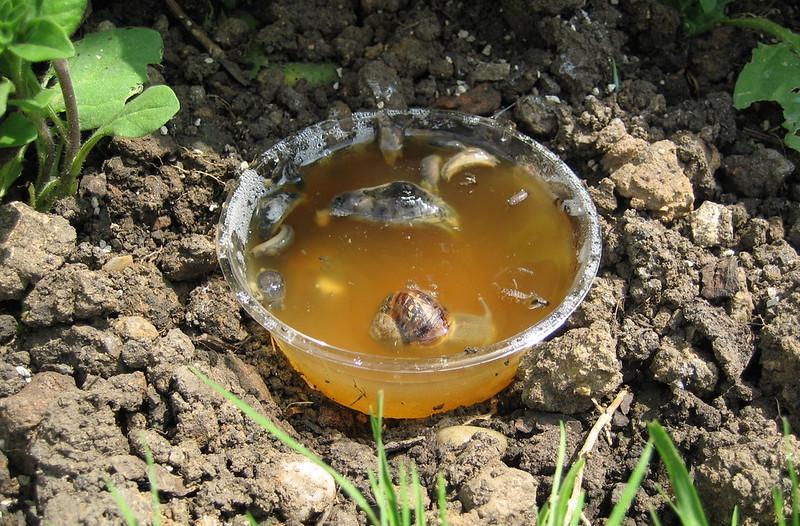
Beer traps are a popular and natural approach to getting rid of garden snails and slugs.
If you are seeking options for organic slug control for your strawberry garden, you will not be disappointed with the choices available. Several organic pest management methods are currently in use, which can be attributed to the remarkable growth of organic agricultural farms, which aim to appeal to those who are health and environmentally conscious.
1. Hand-Picking The Slugs Off Plants
Slugs do not bite, or at the very least, they do not bite people. This means that the slugs on your strawberry bushes can be removed by hand. It will be difficult to handpick slugs during the daytime because slugs typically hide and relax during the daylight.
You should go after them at night when they are more active and easier to catch. Just put on your gardening gloves, and bring a bucket filled with soapy water. After that, remove the slugs from your plants by hand and place them in this bucket.
The soapy water in the bucket will kill them in no time.
2. Using Salt Solution To Kill Slugs
Another great way to kill slugs in your garden is to use a concentrated salt solution.
Just add some salt and water to a spray bottle and mix them together. An exact measurement is unnecessary as long as the salt is clearly discernible in the water. Applying this solution to the sneaky slugs at night should solve the problem.
In a matter of hours, the slugs will become dehydrated and die. However, in order to protect your plants from harm, remove any salt spray that may still be on them in the morning by washing them with water.
3. Beer Traps To Eliminate Slugs
Slugs enjoy beer. Slugs are drawn to beer due to the presence of yeast and sugar, but they die due to the presence of ethanol and the fact that they drown in the container used to trap them.
Beer traps for slugs can be made from recycled yogurt or margarine tubs. Just create a few holes all around the perimeter of the lid of the plastic container. These openings will serve as access points for the slugs inside the container.
You should bury the pots in the ground, but leave about an inch (2.5 cm) of clearance above the soil level. Keeping the traps just above the soil line keeps beneficial insects out. Put these pots all the way around the strawberry plants.
After that, pour two and three inches of beer into each container. Next, regularly inspect these traps. Checking the traps on a regular basis will allow you to replenish the bait and dispose of any dead slugs.
4. Diatomaceous Earth For Slugs
Another good strategy for protecting your strawberries from slugs is to use diatomaceous earth in your garden. Mark the day when the weather forecast says there will be no rain for at least the following 24 hours.
Put on some gloves and a face mask before proceeding to spread the diatomaceous earth across your garden. Take extra precautions to ensure that none of the strawberry plant’s leaves or fruits are contaminated with the compound.
Give the diatomaceous earth a few days to work its magic before disturbing the area again. After that, any slugs or other insects with soft bodies that crawl on it will be fatally injured or killed by its extremely sharp particles.
If necessary, perform the treatment once again on a clean and dry day.
5. Organic Slug Baits
Obtain organic slug baits from the gardening supply store in your area. These baits are poisonous to slugs but harmless to people and dogs.
As with diatomaceous earth, you should schedule this treatment for a day when the weather is dry. Spread the granules around the strawberry plants in your garden and leave them there.
Follow the instructions on the product’s packaging to figure out how much of it should be applied to the area. Then, let the slugs eat the product at night.
When consumed, it will result in the death of the slugs, and you can collect their bodies and dispose of them later in the day or morning.
Chemical Control Methods For Slugs
Chemical methods can be your last but effective option to control slugs on your strawberries. However, these chemical slug-control products are applied to the ground, not the fruit. Moreover, you should always read and carefully follow the product directions.
Here are a few chemicals that you can use to control slugs.
- Metaldehyde
Products containing metaldehyde have been used successfully to eliminate slugs and snails for over 40 years. These remedies operate swiftly and efficiently to eradicate slugs and snails by causing them to lose moisture rapidly, resulting in dehydration and death.
- Iron Phosphate
In the early 2000s, slug and snail control products containing the active component iron phosphate became available. When snails and slugs consume the iron phosphate bait, they immediately cease feeding and retreat to their hiding places. Plant damage is instantly stopped, but the slugs may take a few days to die.
- Sodium ferric EDTA
The most recent product iteration that controls slugs and snails uses an active component called sodium ferric EDTA (Ethylenediaminetetraacetic acid). Their impact on slugs is comparable to that of iron phosphate, but in contrast to iron phosphate and metaldehyde, these items are safe to use in the presence of children or animals.
Related: Slug Eggs in Soil: How to Identify and Get Rid of Them?
How To Prevent Slugs From Attacking Strawberries?
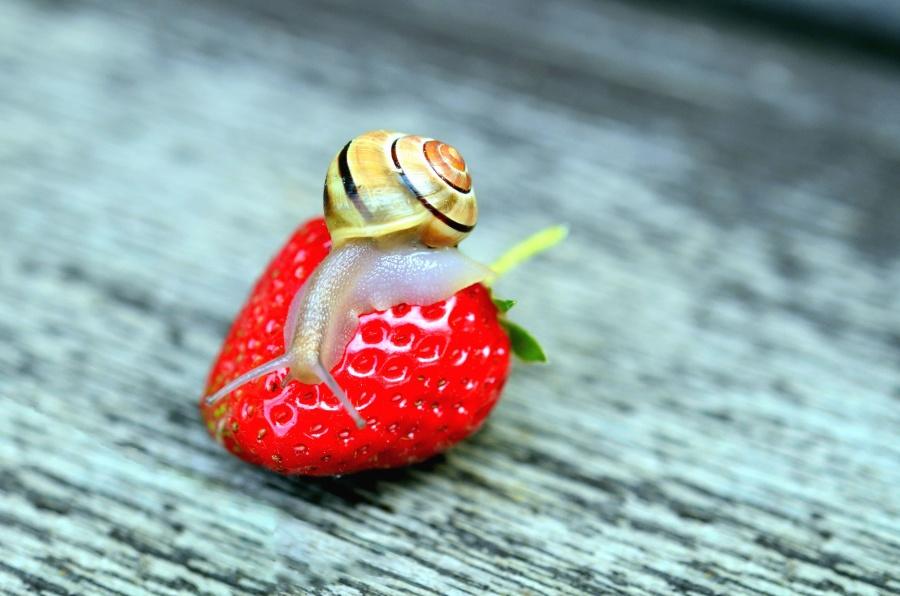
Snails and slugs love organic debris. So, keeping its levels low in the garden can help you control them.
Remember the old saying, care is better than cure! So, the most effective method of combating slugs is to keep them from attacking your strawberry plants in the first place.
Slug control relies heavily on the effective management of the surrounding environment. If the conditions are not favorable for slugs in a place, then slugs will steer clear of it.
Follow these steps to make your garden slug-unfriendly.
- Eliminating slug habitats and hiding places, such as stones, weeds, logs, and boards, is one of the best ways to reduce the number of slugs in your garden.
- Carefully clean vegetable beds in the fall, and in the spring, till the soil lightly. Any slug eggs that have survived the winter will be destroyed if you do this.
- If you are a gardener, you should avoid growing strawberry plants in areas with a lot of rubbish, such as areas with lots of foliage or ground coverings.
- The moist soil accelerates slug growth. So try not to keep the soil moist. This can be accomplished by watering infrequently, deeply, and in the morning.
Conclusion
You can take various steps to prevent slugs from devouring your strawberry crop and reducing the yield. It is best to choose a combination of methods that work best for your garden. And, if you only put a few of the aforementioned strategies into action, you will eliminate the slug problem from your garden once and for all.
Frequently Asked Questions
How do you keep slugs off strawberries organically?
Putting the rinds of citrus fruits at the base of your strawberry plants will deter slugs from attacking your strawberry plants. Citrus attracts slugs, and you can collect them each morning to get rid of them. Diatomaceous earth can also be used as a slug repellent near the base of strawberry plants.
Why are slugs eating my strawberries?
Slugs crave moisture. Therefore, the humid environment under strawberry mulch appeals to them, especially during the wet season. Unfortunately, slugs have the same fondness for your strawberries that you have. They will swiftly consume all of the mature fruits, leaving you with deformed and unappealing fruits to look at.
Do coffee grounds deter slugs?
Coffee grounds are often suggested as a home cure for repelling slugs and snails. However, the evidence supporting this is inconsistent. Nevertheless, caffeine (which is present in coffee grounds) is reported to be toxic to slugs in large concentrations and can slow them down in tiny quantities.
What kills slugs naturally?
Slugs are a delicacy that many predators enjoy eating. To make your garden uninviting to garden slugs, gardening experts advise fostering birds, toads, frogs, ground beetles, and other natural predators. In addition, you can keep slugs away from your garden by cultivating fragrant plants such as garlic, which have a tangy smell.
Does vinegar kill slugs?
It is true that vinegar kills slugs. This method of killing slugs is incredibly effective. Acetic acid, which is present, dries up and kills pests like slugs. In a pump spray bottle, combine equal parts water and vinegar, then spray it on snails and slugs in the evening (when they are most active).
Do crushed eggshells keep slugs away?
Some common wisdom suggests that broken eggshells placed around plants can discourage slugs from making a home there. However, slugs will not be deterred by eggshells, period.
Worse yet, if any residue is left on the shells, they might even attract slugs to your garden.
Where do slugs go during the day?
During the day, slugs and snails might be found hiding in wet areas. They do not love being exposed to the sun, which puts them at a greater risk of dehydration than it would otherwise. They hide beneath logs and stones or beneath the ground cover. They will also conceal themselves beneath pots and low decks in your garden.
Sources For Further Reading
Slugs / Strawberry / Agriculture: Pest Management Guidelines / UC Statewide IPM Program (UC IPM). (2022). Retrieved 27 August 2022, from https://www2.ipm.ucanr.edu/agriculture/strawberry/Slugs/
Slugs in Strawberries | NC State Extension Publications. Retrieved 27 August 2022, from https://content.ces.ncsu.edu/slugs-in-strawberries
Slugs on Strawberries. (2022). Retrieved 27 August 2022, from https://extension.psu.edu/slugs-on-strawberries
Who has been in my strawberries? Slugs and sap beetles, two common pests | University of Maryland Extension. (2022). Retrieved 27 August 2022, from https://extension.umd.edu/resource/who-has-been-my-strawberries-slugs-and-sap-beetles-two-common-pests
Editor’s Recommendations
How To Get Rid Of Millipedes In Home And House Plants For Good!
How To Get Rid Of Springtails In The Soil Naturally? A Comprehensive Guide
How To Get Rid Of Root Mealybugs For Good? A Comprehensive Guide







